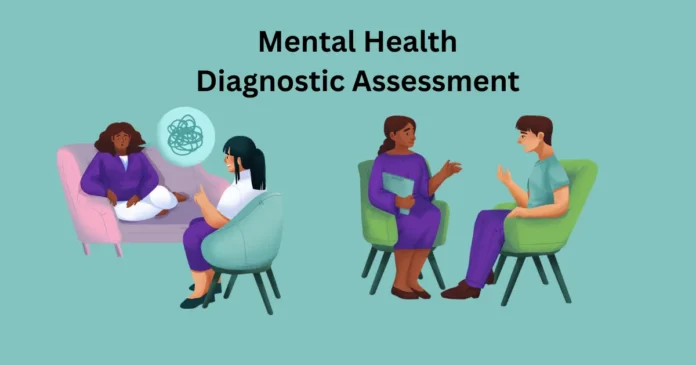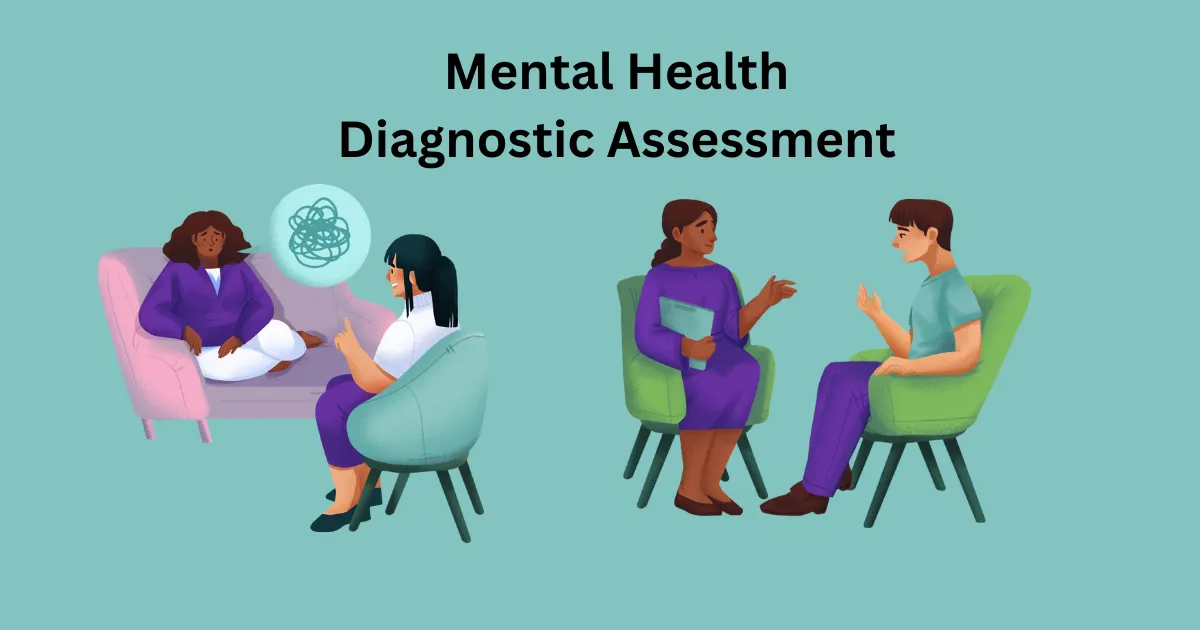Exploring Mental Health Diagnostic Assessment Examples: A Comprehensive Guide
In today’s fast-paced world, mental health has become a growing concern. With the increasing awareness surrounding mental well-being, the need for accurate diagnostic assessments has never been more crucial.
Understanding the various methods and tools used in mental health diagnostic assessments can aid in early intervention and treatment planning.
This article explores different examples of diagnostic assessments commonly employed in the United States, shedding light on their significance in promoting mental wellness.
Table of Contents
- Introduction to Mental Health Diagnostic Assessments
- Diagnostic Assessments’ Significance
- Types of Mental Health Diagnostic Assessments
- Clinical Interviews
- Psychological Testing
- Observational Assessments
- Self-Report Measures
- Clinical Interview: An Insightful Conversation
- Psychological Testing: Understanding Cognitive Functioning
- Observational Assessments: Examining Behavior Patterns
- Self-Report Measures: Encouraging Self-Reflection
- The Role of Technology in Diagnostic Assessments
- Challenges and Limitations
- Overcoming Stigma Associated with Diagnostic Assessments
- Integrating Diagnostic Assessments into Treatment Plans
- Ensuring Confidentiality and Privacy
- Future Trends in Mental Health Assessment
- Conclusion
- FAQs (Frequently Asked Questions)
Introduction to Mental Health Diagnostic Assessments
Mental health diagnostic assessments serve as the foundation for understanding an individual’s psychological well-being. These assessments involve a series of structured evaluations aimed at identifying symptoms, diagnosing mental health disorders, and formulating personalized treatment plans.
Diagnostic Assessments’ Significance
Accurate diagnostic assessments are essential for providing individuals with the appropriate support and interventions they need. By identifying mental health concerns early on, healthcare professionals can prevent the escalation of symptoms and improve overall outcomes for their patients. Here are some important diagnostic assessments are given below
- Assess Prior Knowledge: Diagnostic assessments provide insight into students’ existing knowledge, helping educators tailor instruction to meet individual needs effectively.
- Evaluate Learning Progress: These assessments gauge learning achieved during teaching sessions, enabling instructors to adjust content and activities accordingly for enhanced learning outcomes.
- Enhance Teaching Efficiency: By pinpointing areas requiring focus, diagnostic assessments assist instructors in streamlining teaching methods and content delivery, fostering a more efficient and effective learning process.
- Promote Understanding of Lesson Value: Students gain a clearer understanding of the significance of lessons, modules, or entire courses through diagnostic assessments, motivating them to engage more deeply with the material.
- Address Misconceptions: Diagnostic assessments identify gaps in students’ understanding and misconceptions about subject matter, allowing educators to address these issues promptly and accurately.
- Encourage Information Seeking and Practice: By highlighting areas needing improvement, diagnostic assessments motivate students to seek accurate information and engage in targeted practice, facilitating deeper learning.
- Showcase Care and Support: Utilizing diagnostic assessments demonstrates educators’ commitment to student success, fostering a supportive learning environment where students feel valued and supported in their academic journey
Types of Mental Health Diagnostic Assessments
Clinical Interviews
Clinical interviews involve face-to-face conversations between a trained mental health professional and an individual seeking assessment. These interviews allow clinicians to gather detailed information about the individual’s history, symptoms, and current functioning.
Psychological Testing
Psychological testing encompasses a variety of standardized assessments designed to measure cognitive abilities, personality traits, and emotional functioning. These tests provide valuable insights into an individual’s psychological profile and aid in the diagnostic process.
Observational Assessments
Observational assessments involve the systematic observation of an individual’s behavior in various settings. Clinicians observe how individuals interact with their environment, peers, and caregivers to gain a better understanding of their emotional and social functioning.
Self-Report Measures
Self-report measures consist of questionnaires and surveys that individuals complete to assess their own mental health symptoms and experiences. These measures allow individuals to provide subjective insights into their thoughts, feelings, and behaviors.
Clinical Interview: An Insightful Conversation
During a clinical interview, the clinician engages the individual in a structured conversation aimed at gathering relevant information about their mental health history, current symptoms, and psychosocial functioning. The interview may cover a wide range of topics, including family history, trauma exposure, substance use, and interpersonal relationships.
Psychological Testing:
Understanding Cognitive Functioning
Psychological tests such as intelligence tests, personality inventories, and neuropsychological assessments provide valuable information about an individual’s cognitive abilities, personality characteristics, and brain functioning. These tests help clinicians identify cognitive strengths and weaknesses, as well as potential areas of impairment. Here are some important points related to understanding cognitive functioning:
- Psychological Tests: Intelligence tests, personality inventories, and neuropsychological assessments offer insights into cognitive abilities, personality traits, and brain function.
- Identification of Strengths and Weaknesses: These tests aid clinicians in identifying both cognitive strengths and weaknesses in individuals.
- Assessment of Impairments: Psychological tests help in identifying potential areas of cognitive impairment, such as memory loss or attention deficits.
- Diagnostic Tool: Cognitive assessments serve as diagnostic tools for various conditions affecting cognitive functioning, including dementia, ADHD, and learning disabilities.
- Treatment Planning: Understanding cognitive functioning assists clinicians in developing personalized treatment plans tailored to the individual’s cognitive profile.
- Monitoring Progress: Cognitive assessments are used to monitor progress throughout the treatment process, allowing clinicians to adjust interventions as needed.
- Early Intervention: Early identification of cognitive impairments enables early intervention strategies to mitigate potential negative impacts on daily functioning.
- Research Purposes: Cognitive assessments are utilized in research settings to study the relationship between cognitive functioning and various factors such as aging, mental health, and neurological conditions.
- Educational Planning: Cognitive assessments help educators identify students’ cognitive strengths and weaknesses, informing instructional strategies and accommodations.
- Legal and Forensic Settings: Cognitive assessments are used in legal and forensic contexts to evaluate cognitive competence, capacity, and fitness to stand trial.
Observational Assessments
Examining Behavior Patterns
Observational assessments involve the systematic observation of an individual’s behavior in naturalistic or controlled settings. Clinicians observe how individuals interact with others, respond to stimuli, and regulate their emotions to assess their social, emotional, and behavioral functioning.
Self-Report Measures:
Encouraging Self-Reflection
Self-report measures allow individuals to reflect on their own thoughts, feelings, and behaviors by completing standardized questionnaires and surveys. These measures provide valuable insights into the subjective experiences of individuals and help clinicians assess symptom severity and treatment progress.
The Role of Technology in Diagnostic Assessments
Advancements in technology have revolutionized the field of mental health assessment, making diagnostic tools more accessible, efficient, and user-friendly. Mobile apps, online assessments, and telehealth platforms enable individuals to complete assessments remotely, reducing barriers to care and increasing the reach of mental health services.
Challenges and Limitations
Despite their importance, mental health diagnostic assessments are not without challenges. Issues such as cultural differences, language barriers, and the subjective nature of self-report measures can affect the validity and reliability of assessments. Additionally, the stigma surrounding mental health may deter individuals from seeking help or disclosing sensitive information during assessments.
Overcoming Stigma Associated with Diagnostic Assessments
Efforts to reduce stigma surrounding mental health are crucial for promoting help-seeking behavior and facilitating honest communication during diagnostic assessments. Educating the public about the importance of mental health and destigmatizing discussions about psychological distress can encourage individuals to seek assessment and treatment without fear of judgment or discrimination.
Integrating Diagnostic Assessments into Treatment Plans
Diagnostic assessments play a vital role in informing treatment planning and monitoring progress over time. By accurately identifying mental health concerns and tailoring interventions to meet individual needs, clinicians can maximize the effectiveness of treatment and improve outcomes for their patients.
Ensuring Confidentiality and Privacy
Maintaining confidentiality and privacy is essential in mental health assessments to protect the rights and dignity of individuals seeking help. Healthcare professionals adhere to strict ethical guidelines and legal regulations to safeguard sensitive information and ensure that assessments are conducted in a safe and confidential environment.
Future Trends in Mental Health Assessment
As technology continues to evolve, the future of mental health assessment holds promise for more innovative and personalized approaches. Virtual reality simulations, wearable devices, and artificial intelligence algorithms may revolutionize the way mental health assessments are conducted, providing more accurate and comprehensive insights into individuals’ mental well-being.
Conclusion
In conclusion, mental health diagnostic assessments play a crucial role in identifying, diagnosing, and treating mental health disorders.
By employing various assessment methods such as clinical interviews, psychological testing, observational assessments, and self-report measures, healthcare professionals can gain a comprehensive understanding of individuals’ mental health needs and provide them with the appropriate support and interventions.
Despite challenges such as stigma and cultural barriers, efforts to promote awareness, reduce stigma, and integrate assessments into treatment plans are essential for improving mental health outcomes and promoting overall well-being.





